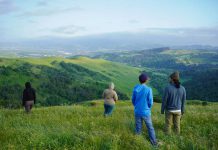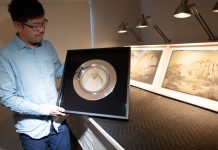Care available in South Valley if one knows where to look
Daniel Reyes Corona, his left hand immobilized in a splint since
he was assaulted by two chain-wielding men outside a Morgan Hill
market a week ago, dropped by the RotaCare free clinic in Gilroy on
Tuesday for a consultation.
”
I can’t work without my hand, and I don’t have insurance,” said
Reyes Corona, 25, a transplant from Mexico’s sweltering Pacific
coast in Michoacan who does landscaping and ranch work in the South
Valley.
Care available in South Valley if one knows where to look
Daniel Reyes Corona, his left hand immobilized in a splint since he was assaulted by two chain-wielding men outside a Morgan Hill market a week ago, dropped by the RotaCare free clinic in Gilroy on Tuesday for a consultation.
“I can’t work without my hand, and I don’t have insurance,” said Reyes Corona, 25, a transplant from Mexico’s sweltering Pacific coast in Michoacan who does landscaping and ranch work in the South Valley.
Reyes Corona was one of 15 to 20 patients waiting to see Dr. Michael Matsumoto or nurse Lesley Allen at the clinic, sponsored by the Rotary Club and supported by medical and non-medical volunteers.
“This is the kind of case we do real well – complaints like flu, scrapes, earaches, viruses, coughs, colds and allergies,” said Gary Sargenti, a past Rotary president and a clinic volunteer.
“The cost of the same services at a hospital emergency room can be four to five times more,” Sargenti said.
Among others treated Tuesday were Rocio Urrutia, who’s been coming to the Ochoa center for 30 years, first as a child with her parents and for the past 14 years with her husband, Albino Zazueta, who works for lettuce giant Tanimura and Antle.
Urrutia, congested and suffering from headaches, was looking for medicine similar to what a doctor in Yuma, where she winters, had given her six or seven years for the same symptoms.
Lupe Camarillo Delgado of McAllen, Tex., arrived with sons, Emilio, 3, and Harley, 5. The younger boy needed iron for a low hemoglobin count, she learned.
One of nine RotaCare free clinics along the Central Coast from San Rafael to Monterey, the Gilroy facility opens once a week at the Arturo Ochoa Migrant Center to provide basic care and diagnoses for migrants, the homeless and the uninsured.
It is one link in the chain of health care organizations that offer frontline service to the down-and-out, including Santa Clara County’s clinic in San Martin, its public health department, the Gardner Family Center and the community clinics and other services funded by The Health Trust.
“We’re interested in the population that is not getting service. I suppose there is some overlapping of services. But the lack of or difficulty in finding transportation makes it rare,” said Cynthia Haynes, Region 6 manager of Santa Clara County’s public health department.
Among its outreach efforts, the public health department sends a van with two nurses and two aides to each of four sites once a month on Wednesday. The vans serve Avante Village in Morgan Hill, the Ochoa center and two large apartment complexes in Gilroy.
“We don’t have physicians and we don’t prescribe medicine,” Haynes said. “The teams act on referrals from social workers, hospitals or communicable disease or TB authorities. For example, they test for salmonella, lead poisoning, tuberculosis, blood sugar, hemoglobin, cholesterol and diabetes. They also assess symptoms in case someone needs treatment, get people into a health plan if they qualify and disseminate information on nutrition and education about sexually transmitted diseases.”
If clients need X-rays, medicine or an operation, they are referred to a hospital, Haynes said.
Haynes thinks that the lack of insurance or financial stability keeps some South Valley residents from seeking medical attention.
Someone has to pay, according to Denise Ramos, manager of the Santa Clara County clinic in San Martin.
“Service is not free, as a lot of people think. If a patient doesn’t have insurance, we network to find sources. There are so many government programs out there,” Ramos said.
Caseloads at the clinic reflect the changing economy, Ramos said.
“With the recession, we’ve seen more of the laid-off population, people with no insurance and no money in their pocket, but who may qualify for Medical,” Ramos said.
Service at the San Martin clinic, Ramos said, is appointment-based.
“We don’t turn someone away in an emergency, but we’re not a drop-in clinic,” Ramos said of the clinic staffed by nine specialists, two in internal medicine, three pediatricians and four in family practice, including OB-GYN.
Dental service also is available and classes are offered on pre-natal care, diabetes and nutrition.
The San Martin clinic, which serves residents from Bernal Road in South San Jose to the San Benito County line, is a full-service facility, offering pharmacy, laboratory and radiology.
“We’re almost at capacity and need more examination rooms,” Ramos said, noting the 36,000 visits registered at the clinic last year.
Allen, the site manager at the Ochoa clinic, is a nurse practitioner at the Eliot Neighborhood Health Center in Gilroy. The center is one of eight school-based health centers operated by The Health Trust in four school districts with an eye to keeping youngsters healthy and in school.
The centers offer primary health care to children and adolescents. Services include physical examinations, dental screening, health education, immunizations, diagnostic lab tests, treatment of minor illnesses and injuries and mental health support and referral.
In 2001, more than 11,000 school children and their siblings visited the health centers.
The Health Trust, created in 1996 when for-profit HCA bought the non-profit Good Samaritan health care system, spends $12 million to $13 million for its own programs and grants to other agencies, according to Catherine Edwards, the organization’s vice president for communications.
While the Trust partially funds its programs from the assets left from the Good Sam sale, it relies mainly on individual, foundation, government and corporation grants.
Among its programs: The Meal on Wheels program for the frail elderly. It also gave $110,000 to the Stanford Center for Research in Disease Prevention, will again fund an annual flu and pneumonia vaccinations and joined the Silicon Valley Council on Aging in offering prostate cancer screening.
“We are a catalyst for access to health care,” Edwards said.
RotaCare, which began in San Jose in 1989 and opened it first South Valley clinic in Morgan Hill two years later, had strong ties – an essential for success — with St. Louise Hospital its early years, Sargenti said.
Attendance dropped off over time, Sargenti said, but renewed effort among Rotary members brought a resurgence over the past 18 months.
“We had a beautiful clinic that no one came to, but now again we have established that we want to be a valuable resource for the needy,” Sargenti said.
The goal now is to extend the RotaCare clinics beyond the Central Coast, Sargenti said.
“We envision a Rotary-wide program, and it’s possible with high-level support,” Sargenti said. “We need other Rotary clubs to make it work. It takes time and effort.”
RotaCare also needs more corporate support and a larger cadre of medical and non-medical volunteers, Sargenti said.









